Collision
General cargo vessels Florence Spirit and Alanis
Welland Canal, Ontario
The occurrence
On 11 July 2020, the general cargo vessels Florence Spirit and Alanis collided near mile 16 in the Welland Canal, Ontario. Both vessels sustained major damage to their hull structures. No injuries or pollution were reported.
Safety Communications
Safety advisories
Media materials
News releases
Hydrodynamic forces, combined with the proximity of the bank, caused the collision between cargo vessels Florence Spirit and Alanis in the Welland Canal, Ontario, in July 2020
Read the news release
Deployment notice
TSB deploys a team of investigators to the site of a collision between the vessels Alanis and Florence Spirit in the Welland Canal, Ontario
Québec, Quebec, 12 July 2020 — The Transportation Safety Board of Canada (TSB) is deploying a team of investigators to the site of a collision between the vessels Alanis and Florence Spirit that occurred yesterday in the Welland Canal, Ontario. The TSB will gather information and assess the occurrence.
Download high-resolution photos from the TSB Flickr page.
Class of investigation
This is a class 3 investigation. These investigations analyze a small number of safety issues, and may result in recommendations. Class 3 investigations are generally completed within 450 days. For more information, see the Policy on Occurrence Classification.
TSB investigation process
There are 3 phases to a TSB investigation
- Field phase: a team of investigators examines the occurrence site and wreckage, interviews witnesses and collects pertinent information.
- Examination and analysis phase: the TSB reviews pertinent records, tests components of the wreckage in the lab, determines the sequence of events and identifies safety deficiencies. When safety deficiencies are suspected or confirmed, the TSB advises the appropriate authority without waiting until publication of the final report.
- Report phase: a confidential draft report is approved by the Board and sent to persons and corporations who are directly concerned by the report. They then have the opportunity to dispute or correct information they believe to be incorrect. The Board considers all representations before approving the final report, which is subsequently released to the public.
For more information, see our Investigation process page.
The TSB is an independent agency that investigates air, marine, pipeline, and rail transportation occurrences. Its sole aim is the advancement of transportation safety. It is not the function of the Board to assign fault or determine civil or criminal liability.

